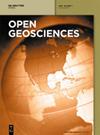Evolutionary game analysis of government, businesses, and consumers in high-standard farmland low-carbon construction
IF 1.3
4区 地球科学
Q3 GEOSCIENCES, MULTIDISCIPLINARY
引用次数: 0
Abstract
Soil is an important carbon reservoir, and high-standard farmland construction projects have significant potential to promote low-carbon development. In order to study the management and implementation of low-carbon production in high-standard farmland construction projects, the tripartite evolution game model of government, business, and consumer is constructed based on the tripartite bounded rationality. Then, the behavior strategy of tripartite stakeholders is analyzed with the method of system dynamics. Finally, the evolution process of tripartite interaction behavior is simulated using the MATLAB tool. The results show that: (1) The subsidy and punishment mechanism of the government must be aligned. In addition, the net income of government regulation is higher than the sum of the government’s environmental governance fees and fines of non-regulation; (2) The government, business, and consumers all choose their own behavioral strategies based on their own interests. (3) When the government’s environmental governance fee reaches a particular value, the system will appear imbalanced. In light of this, it is suggested that the government should increase support for business and use media publicity, consumer subsidies, and other measures to promote the consumption of low-carbon products. The business should constantly reduce the cost of carbon emission reduction through technological innovation.高标准农田低碳建设中政府、企业和消费者的进化博弈分析
土壤是重要的碳库,高标准农田建设项目具有促进低碳发展的巨大潜力。为研究高标准农田建设项目中低碳生产的管理与实施,基于三方有界理性,构建了政府、企业、消费者三方演化博弈模型。然后,运用系统动力学方法分析三方利益相关者的行为策略。最后,利用 MATLAB 工具模拟了三方互动行为的演化过程。结果表明(1) 政府的补贴和惩罚机制必须保持一致。此外,政府监管的净收益要高于政府环境治理费与非监管罚款之和;(2)政府、企业、消费者都会根据自身利益选择行为策略。(3)当政府的环境治理费达到某一特定值时,系统就会出现失衡。鉴于此,建议政府加大对企业的扶持力度,利用媒体宣传、消费补贴等措施促进低碳产品的消费。企业应通过技术创新,不断降低碳减排成本。
本文章由计算机程序翻译,如有差异,请以英文原文为准。
求助全文
约1分钟内获得全文
求助全文
来源期刊

Open Geosciences
GEOSCIENCES, MULTIDISCIPLINARY-
CiteScore
3.10
自引率
10.00%
发文量
63
审稿时长
15 weeks
期刊介绍:
Open Geosciences (formerly Central European Journal of Geosciences - CEJG) is an open access, peer-reviewed journal publishing original research results from all fields of Earth Sciences such as: Atmospheric Sciences, Geology, Geophysics, Geography, Oceanography and Hydrology, Glaciology, Speleology, Volcanology, Soil Science, Palaeoecology, Geotourism, Geoinformatics, Geostatistics.
 求助内容:
求助内容: 应助结果提醒方式:
应助结果提醒方式:


